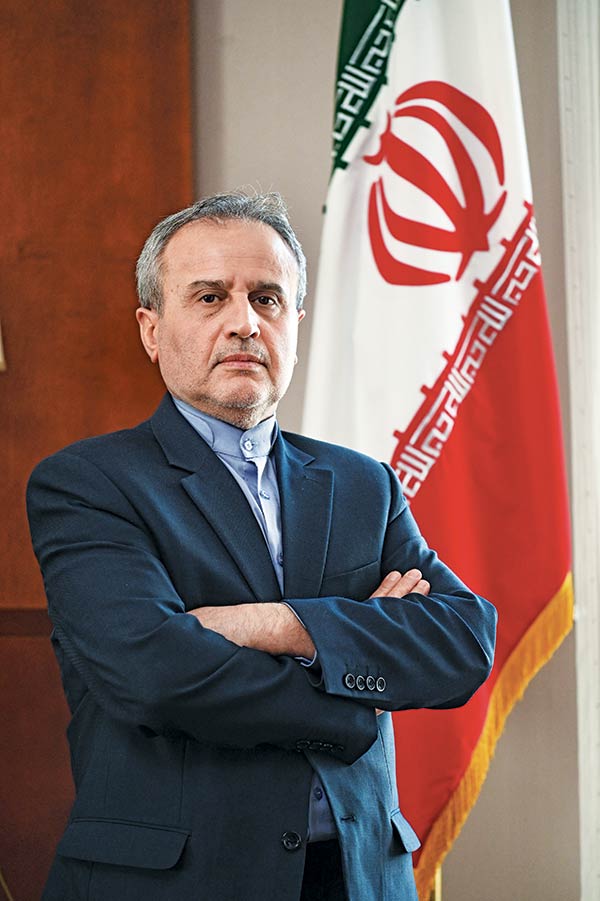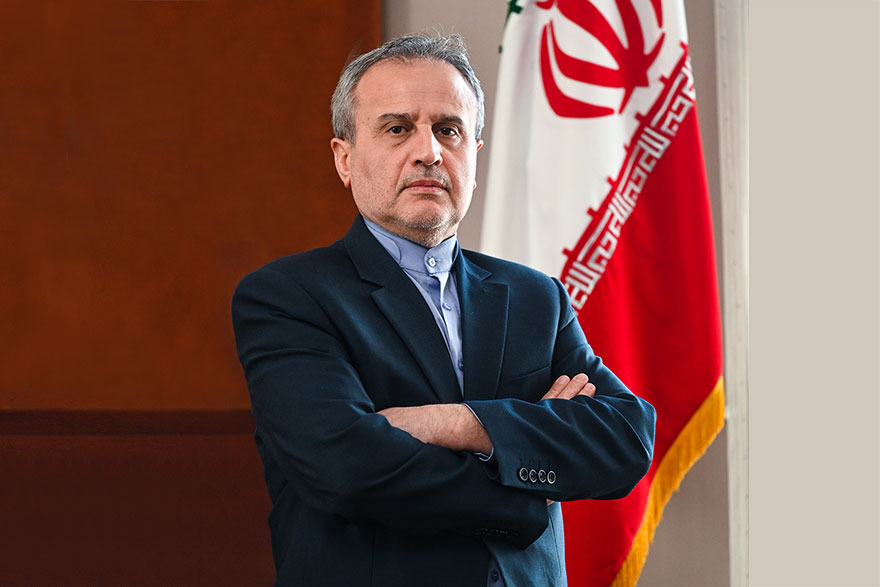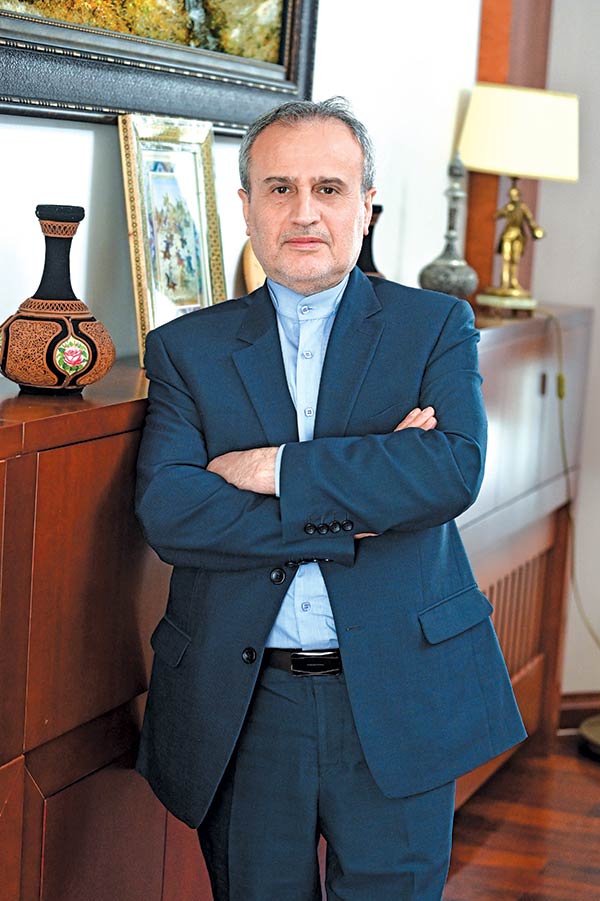The U.S. unilaterally violated Resolution 2231 and withdrew from the Iran nuclear deal. This action and the oppressive sanctions exert huge pressure on the economy and people of my country. However, it has also brought about an unprecedented political isolation of the U.S. in the world. Let us hope that the new president will return from this wrong path – Rashid Hassan Pour Baei
Just like the rest of the world, Iran has spent recent months battling against the third wave of the COVID-19 pandemic, which has already claimed more than 40,000 lives. A successful response to this novel coronavirus requires global mobilisation and cooperation between countries, says Iranian Ambassador Rashid Hassan Pour Baei in this interview for CorD Magazine. However, he adds, the fight against the pandemic in Iran is also hampered by U.S. sanctions, which have limited the possibility of procuring medicines and equipment to help the sick.
Your Excellency, considering that Iran has been hit hard by the COVID-19 pandemic, what is the situation in the country like at present?
The Islamic Republic of Iran, like other countries, was somewhat taken aback by the outbreak of the COVID-19 pandemic, although Iran has significant medical potential. Our medical experts are among the most recognised in the world, with a high level of expertise. We are also doing well in terms of medicines and medical equipment production. We managed to keep the disease under control in the 1st and 2nd waves of the pandemic by using these capacities. However, the sanctions have seriously limited access to medicines and medical equipment. On the other hand, major cities, such as Tehran, which has a population of some 15 million inhabitants, faced certain impediments that hampered limitations imposed in the long run. Unfortunately, the number of diseased and deceased from infection has increased in the 3rd wave of the COVID-19 pandemic. Like many other countries, including Serbia, we are working hard to ward off the virus in this 3rd wave.
Does Iran need some form of assistance from the international community in order to combat the pandemic; and, if so, has that assistance been forthcoming?
Irrespective of cause or origin, the COVID-19 pandemic has become a global threat and challenge. No country is safe and each country has to deal with it. The solution is joint global effort and collective action. Entanglement, mutual dependency and wide contacts and communication among all people hinder countries in independently achieving great success in fighting the pandemic. Iran has always voiced its complete readiness to form a global mobilisation. Meanwhile, Iran is no exception, it hasn’t just strived to use all of its resources to help, but also to welcome every assistance and cooperation. Regrettably, harsh and oppressive U.S. sanctions have prevented this interaction. The claims of U.S. officials that they are concerned or ready to help the Iranian people in fighting COVID-19 are nothing but lies. They blocked all of our financial means for procuring medicines for the treatment of coronavirus infected patients and those suffering other specific diseases. The high number of deceased in Iran during the pandemic is a direct result of the U.S. sanctions. In today’s world peace, security, stability, progress, health and the prosperity of nations are mutually intertwined and inseparable.
How would you comment on the outcome of the recent U.S. presidential election, which was said could be crucial for America’s relations with Iran?
Elections are internal affairs of every country. Our foreign policy is not based on the presence of either Democrats or Republicans in the White House. Our strategy will not change whoever becomes the U.S. president. Of course, if someone in the White House should recognise the rights and interests of our people and our country, based on mutual respect, we would welcome that and respond appropriately. Biden’s coming to power could be a chance for a change and the reinstituting of respect and adherence to international norms, legal commitments and responsibility.
 The Iran Nuclear Deal with P5+1, or JCPOA, is the most important diplomatic achievement of the past hundred years. The JCPOA was a guarantee of the interests of all participants in the Deal, and certainly a guarantee of regional and international peace and security, and its signing was supported by the UN Security Council. While Iran was fulfilling its commitments, the U.S. violated Resolution 2231 unilaterally and withdrew from the JCPOA. This action, and the oppressive sanctions, exert huge pressure on the economy and people of my country. However, it has also brought about the unprecedented political isolation of the U.S. around the world. Let us hope that the new president will return from the wrong path and revive the JCPOA, which was concluded during the time of President Obama and Vice-President Biden.
The Iran Nuclear Deal with P5+1, or JCPOA, is the most important diplomatic achievement of the past hundred years. The JCPOA was a guarantee of the interests of all participants in the Deal, and certainly a guarantee of regional and international peace and security, and its signing was supported by the UN Security Council. While Iran was fulfilling its commitments, the U.S. violated Resolution 2231 unilaterally and withdrew from the JCPOA. This action, and the oppressive sanctions, exert huge pressure on the economy and people of my country. However, it has also brought about the unprecedented political isolation of the U.S. around the world. Let us hope that the new president will return from the wrong path and revive the JCPOA, which was concluded during the time of President Obama and Vice-President Biden.
Iranian policy is based on a commitment to obligations, provided they are also fulfilled by all parties involved, while our approach is strategic patience and maximising all capacities for diplomacy. For this reason, after the U.S. withdrawal from the JCPOA – and at the request of other JCPOA participants – we have waited for more than a year and fulfilled our commitments. The Iranian decision is known: the survival and full implementation of the JCPOA. The ball is now in the other party’s court.
Our strategy will not change whoever becomes the U.S. president. Of course, if someone in the White House should recognise the rights and interests of our people and our country, based on mutual respect, we would welcome that and respond appropriately
Iran recently presented a plan aimed at resolving the conflict between Azerbaijan and Armenia in the Nagorno-Karabakh region. Given its assumption that Azerbaijan’s territorial integrity is indisputable, can this plan be acceptable for the Armenian side?
The Iranian approach is regional security. We perceive the security of our neighbours as our security too. So, we are concerned by any military conflict between our neighbours. Iran is the only country in the region which has friendly relations with both Azerbaijan and Armenia, sharing some 800km of borders with them. It is normal that we are more concerned than others and feel a greater responsibility. The Armenian foreign minister stated recently that Iran has a responsible and constructive position regarding regional and global security. At the same time, Iran’s plan points out Azerbaijan’s territorial integrity and the protection of the interests and rights of the Armenian population in Nagorno-Karabakh. Iran has strong foreign policy principles and is calling for peace, dialogue and cooperation within the region. The plan presented by Iran calls for the preservation of the territorial integrity of the countries as fundamental principle of international law, while simultaneously calling for humanitarian aspects and discussion of the real interests of all sides involved.
War and bloodshed cannot resolve border conflicts. In good faith, we urge both sides “to cease fire immediately”, and then to start a “comprehensive dialogue”. As was the case during the 1992 crisis, we announced our readiness to mediate between the two neighbours. We believe that permanent peace can be only achieved through the political will of both Baku and Yerevan, and through the respect of territorial integrity and international regulations.

From the start of the crisis in Nagorno-Karabakh, we have consulted with regional countries, including Azerbaijan, Armenia, Russia and Turkey. We believe that the countries of the region suffer the most damage in this crisis and war.
Iran has always played a role aimed at creating a balance, not intervention, across the entire region, particularly in the South Caucasus. We are against any ethnic or territorial separation and conflict. Unlike some regional countries, we have good relations with both Azerbaijan and Armenia. We believe that intervention by any country in the region, especially powers beyond the region, would worsen the crisis. Our red line is our own security. We will never give up our national security, nor will we make any compromise with any country in this regard.
Iran supports the present ceasefire between Azerbaijan and Armenia, supervised and mediated by Russia.
The Armenian foreign minister stated recently that Iran has a responsible and constructive position regarding regional and global security. At the same time, Iran’s plan points out Azerbaijan’s territorial integrity and the protection of the interests and rights of the Armenian population in Nagorno-Karabakh
Diplomatic relations between Iran and Serbia go far back into the past. Based on your own experience, what could you say about bilateral relations between our two countries?
The relations between Iran and Serbia were established in 1937, hence the 80th anniversary of the establishing of diplomatic relations between the two countries was marked and celebrated in Belgrade in 2017, with an exhibition of historical documents over an 80-year period on diplomatic relations between the two countries. Yet, according to some documents that are available, the history of Iranian-Serbian relations and initial political contacts date back more than 130 years.
Iran and Serbia, as two friendly countries, have always strived to act on the basis of mutual respect, to look ahead and, in this regard, resolve issues emerging between the two sides, which in certain terms paves the way for more interaction and cooperation in regional and international domains. The Serbian Government has always shown an interest in developing and strengthening cooperation in various fields of politics, economics, defence, tourism, culture, science and education, and in practise has taken tangible and important steps to prove its positive will. The cooperation process is affirmative and has improved over the years. For instance, since 2016 Serbia has voted in favour of Iran regarding the political resolution on the human rights situation in Iran. Meanwhile, Iran has defended Serbia’s territorial integrity and national sovereignty.
 Although the international atmosphere after the U.S. withdrawal from the JCPOA and the reimposing of unilateral U.S. sanctions against our country has affected some areas of the two countries’ cooperation, including in the economy, the trade exchange volume has still increased in recent years, and we hope to see the further growth of trade and economic exchanges in future, with the positive approaches that the two countries have taken towards each other in the field of bilateral and international cooperation.
Although the international atmosphere after the U.S. withdrawal from the JCPOA and the reimposing of unilateral U.S. sanctions against our country has affected some areas of the two countries’ cooperation, including in the economy, the trade exchange volume has still increased in recent years, and we hope to see the further growth of trade and economic exchanges in future, with the positive approaches that the two countries have taken towards each other in the field of bilateral and international cooperation.
After the introduction of a visa-free regime and direct flights in 2017, the two countries saw an increase in tourist exchanges and business activities, but with the visa regime having been restored due to pressure from some European countries, conditions have changed and previous restrictions have been renewed. Comparative advantages and closeness of views in the field of international relations have always encouraged the continuation and development of cooperation between the two countries, even under difficult conditions.
The Cultural Centre of the Iranian Embassy, in cooperation with various cultural, academic and educational institutions of Serbia, has strived to broaden cultural cooperation and identify sociocultural capacities and joint characteristics.
The two countries’ cultural and social similarities enable them to better understand each other by expanding cultural cooperation, such as through film, books etc., even during the COVID-19 pandemic.
Cooperation between the parliaments of Iran and Serbia was at an intensive level just a few years ago. Is that cooperation continuing?
In the past several years, parliamentary relations between Iran and Serbia had an acceptable trend, along with the relations in other sectors. During these years we saw the exchange of delegations at the level of the two countries’ parliamentary speakers and heads of parliamentary friendship groups and foreign affairs committees. Last year we had a high-level four-day visit by the Iranian parliamentary delegation, headed by the Parliamentary Speaker, which held bilateral meetings and participated in the 140th IPU conference in Belgrade, which is considered a turning point in the two countries’ relations.
Parliamentary elections were held in both Iran and Serbia this year. We hope that the interaction and cooperation of these institutions will be promoted even further during the new convocation of both parliaments.
As people’s representatives and a place to express their will, parliaments can propose to executive authority in a large number of areas for bilateral cooperation in the political, economic, cultural and social fields. Iran has always supported the development of parliamentary relations and cooperation between the two countries.
Subsequently, simultaneously with the abolition of the visa regime by the two countries, the 1st joint trade and investment conference of Iran and Serbia was held in Belgrade, in February 2018, and was attended by more than 150 businesspeople, providing a valuable opportunity to see the potential of the two countries in the field of trade and investment
What is expected to be the fate of the free trade agreement between our two countries, which was announced in 2018 but has yet to be implemented?
With the aim of developing economic and trade cooperation, after several delays, the 14th Session of the Joint Committee for Economic Cooperation of the two countries was held in Tehran in 2015. Subsequently, simultaneously with the abolition of the visa regime by the two countries, the 1st joint trade and investment conference of Iran and Serbia was held in Belgrade, in February 2018, and was attended by more than 150 businesspeople, providing a valuable opportunity to see the potential of the two countries in the field of trade and investment.
The 15th Session of the Joint Committee for Economic Cooperation of the two countries was held in Belgrade in June 2018. On the margins of this event, the 2nd conference on the two countries’ economic opportunities was held at the Serbian Chamber of Commerce & Industry, and included the participation of businessmen from the private and public sectors of both Iran and Serbia, in the presence of trade ministers and presidents of chambers of commerce. This session of the joint committee envisaged the holding of the 1st round of negotiations on free trade between the two countries, which regretfully had to be delayed due to the COVID-19 pandemic. We hope that, after the forming of the new Serbian Government and the end of pandemic, the process of cooperation will be stronger and faster.
We’ve seen the promotion of trade between the two countries in previous years, but – given the existing capacity – this trend is not satisfactory. The two countries have good capacities to enhance cooperation in agriculture, industry, mining, construction, energy, petrochemicals, tourism and other areas. These capacities, on the one side, and the interest of businessmen and companies in cooperation, on the other, are the reason why drafting a free trade agreement should be on the agenda of the two countries’ activities in areas of bilateral relations.
The migrant crisis and EU rules that Serbia (as a membership candidate country) must respect, made it impossible to implement the agreement on a visa-free regime between Iran and Serbia. Can relations between the two countries, primarily economic relations, develop without that agreement?
The Serbian Government’s decision to suspend the visa-free regime for various reasons, including the migrant crisis and Serbia’s accession to the EU, excluded the possibility of relations between the two countries being facilitated, especially in the field of tourism and relations between the two nations. Since the role of the visa-free regime is not basic, but facilitating, the basic and fundamental reasons for the development and promotion of relations were not damaged with the suspension of this regime.
Surely relations between the two countries, mainly in the economic sector, will remain on the path of improvement, even without the abolishing of the visa regime, as is the case with Iran’s biggest economic and trade partners, which are also countries with which we don’t have a visa-free regime.
| JCPOA
The Iranian decision is known: the survival and full implementation of the JCPOA. The ball is now in the other party’s court |
NAGORNO-KARABAKH
War and bloodshed cannot resolve border conflicts. In good faith, we urge both sides “to cease fire immediately”, and then to start a “comprehensive dialogue” |
COOPERATION
The two countries have good capacities to enhance cooperation in agriculture, industry, mining, construction, energy, petrochemicals, tourism and other areas |
|---|